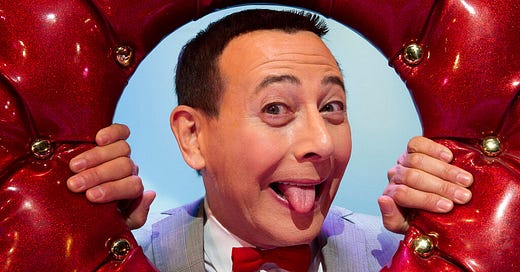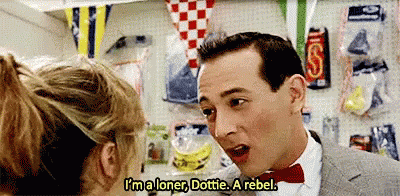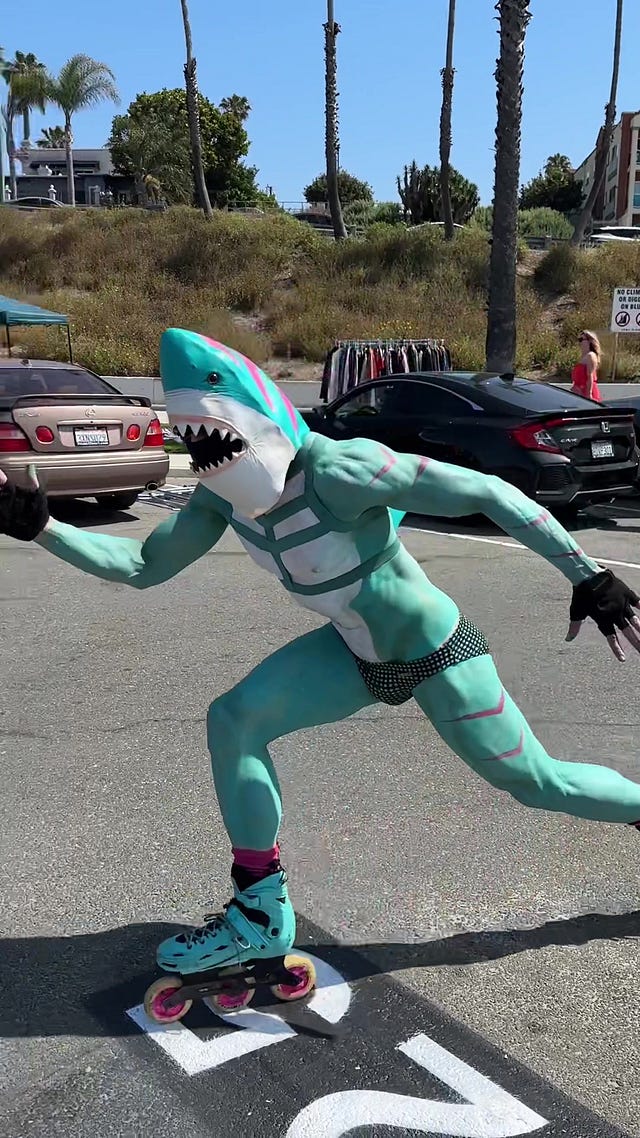This Barbie discourse is a reminder: So many millennials, us children of second wave feminists, never had Barbies. Barbies had long legs and blonde hair and tanned white skin and frankly, our parents believed, there were so many ways to occupy a child’s imagination than HI PRETTY LADY. (I eventually got some Barbie that had neon and a Ken who had an ice skating uniform—100% a gift from a well-meaning friend.)
Instead, my parents used my childhood to curate mini-extensions of themselves. Colorforms, to inspire both a passion in art and maybe a love of Devo. Books written by David Byrne. And of course, of course, Pee-Wee Herman.
Pee-Wee’s Playhouse was a staple of Saturday morning TV, the type of TV my parents would watch with me, laughing at the double entendres and the sheer weirdness of a shrill, manic man dressed as a child, behaving like a true manifestation of the id. The theme song was written by perpetual weirdo Cyndi Lauper. The set design was a post-modernist fever dream with a talking chair and an anthropomorphic globe with a French accent. It made no sense. It was the best thing in the entire world.
We know what it feels like to have your heroes die. But what about having your weirdos die? Those bastions of subculture who remain unbowed by trends, by gender , by the relentless marketing machine? Those who stand on the outside with no interest in looking in?
Society doesn’t quite know how to honor the weird, that vibrantly unsettling iconoclast, except to try to pull her in, weave her into our daily fabrics as if she was always existed there. She didn’t.
Pee-Wee Herman is a decidedly Gen X figure. So was Sinéad O’Connor, born of an era where embracing the weird and unusual was hallowed rebellion. Gen Xers were drawn in by weirdness, obsessed with rejecting normalcy. “Alternative” rock vs. mainstream. Keeping it real vs. selling out. MTV vs. network television. John Waters. Bjork. Grant Morrison. Twin Peaks. Whatever type of music Primus is. Gregg Araki. Quentin Tarantino. Captain Beefheart. Ween. (Ugh. Ween.) Parker fucking Posey. (Note: All of these figures are white folks, a demo who could choose whether or not to be taken “seriously”. People of color usually didn’t have the luxury of being “weird” in the ‘90s without being a joke. See: Carlton, Blowfly, Urkel.)
And the weirdos, mister, are all gone.
Let’s look at what makes weirdness, true weirdness, not omg i’m so random lol, but the actual, legitimately weird.
Weird is not comfortable. It talks to loud and doesn’t fit in. It unsettles you. It tastes funny in the mouth. Awkward and disruptive.
Weird is not easy to monetize. I mean, it can be done, but because the truly bizarre generally appeals to niche communities, it’s not worth a real investment. Fellow Gen X icon Mr. Al Yankovic (he’s weird!) is a good example: a very specific offering that refuses to compromise its brand.
Weird is queer1. By queer, I am taking as wide of a definition as I can, referring to anything that doesn’t fit neatly in a straight cis box. Those pushed out of society tend to define themselves against it. Queer itself means weird. The queers are weirds.
Weird is generally not attractive. Ah, yes, the Aubrey Plaza conundrum. She has consistently pushed herself outside of a traditional trajectory by playing zombies, psychos, and inmates (and…cats), but she’s extremely pretty and everyone likes her. She strives for weirdness, but has a privileged leg up due to being hot.
Weird has a perspective. Weird understands that “being weird” doesn’t refer to anything other than an aesthetic, and that weirdness has a way of looking at the world that is remarkably unusual. Weird often doesn’t know it is weird. That’s what makes it weird.
And in 2023, true weirdness, the type that dances on your bar in platform heels, is pretty much nonexistent. It’s all been regurgitated and sold back to us. Pretty much, but not entirely.
You see, Gen Z doesn’t do weird like their parents. Billie Eilish is not weird. She dyes her hair and wears oversized clothes, but she isn’t weird. Instagram stars are not weird. They paint their nails and experiment with pronouns, but that isn’t weird when you have five million followers and your behavior lands you brand deals. Emma Chamberlain is not weird (sorry, Taylor Lorenz). She is skinny and fun and everyone likes her. Even that erstwhile purveyor of the macabre, Paul Rueben’s collaborator Tim Burton, has been algorithmically optimized to provide you a palatable TV series that has lines like, “I find social media to be a soul-sucking void of meaningless affirmation.”
Because weirdness is defined as being counter to dominant culture, what then happens when dominant culture…disappears? Dominant culture has been bifurcated and “the once omnipotent gatekeepers of culture were suddenly replaced by machines, as content based on our online behaviours replaced chronological feeds.” The mainstream no longer exists, the gatekeepers have left their posts. Alternatives have been gentrified. There is no subculture to escape to anymore.
Or rather, in the advent of niche TikTok communities and personalized Discords and the memetic nature of social media, there is nothing but subcultures. Nothing is weird when an algorithm caters to your specific tastes, serves up your quirks and eccentricities to millions of people just like you. Gen X’s weird was secret, just below the surface, but now there is no more underground. There’s just things that have a lot of streams on Spotify, and things that don’t.
“So, how does art even get made when things are so rotten, and horrible, and crazy, and weird, and mixed up,” Reubens wondered. “Who has the nerve to be an artist? You have to have some nerve to be an artist.” Indeed, legitimate weirdness still exists. (In researching this piece, Eric Andre was consistently brought up. Same with Meg Stalter, Janelle Monae, Tim Robinson. All complete weirdos.) But that secret, subversive wink my mother got every time Miss Yvonne walked onto the screen during Pee-Wee’s slot on CBS (!!) mornings is never going to be truly replicated again. It was weird lightning in a weird bottle.
We, or at least those who control the flow of content/information, no longer platform the weird. Not really. (Netflix did in its early incarnation as it tried to win over auteurs who wanted creative freedom, like Pee-Wee Herman himself, but it quickly found that niche acts aren’t scalable.) Instead, data informs everything—what movies get made, what content is served, what comes next on the playlist, hoping something can break through.
There is some hope: In the meantime, weird has found a way to platform itself—ignoring the need for CBS Saturday Mornings. Strange cultures on TikTok emerge, creating various legends, its own heroes. (It is no surprise that Paul Ruebens himself became obsessed with TikTok in his later years.) Weird is a sexy dude dressed as a shark on rollerblades becoming a celebrity. Weird is changing genders and having a laugh about it. Weird is…whatever this is. It’s not the artist who is weird, but the art, and the way we subsequently understand it.
The likelihood of seeing the truly unique on television or major labels or in theaters or in ads is fading with the deaths of our weirdo heroes. CBS will never pick up another Pee-Wee Herman, modern record labels would never put their Sinéad O’Connor on live TV, MTV is the purveyor of reality TV2. Which is fine. Don’t let them sell us weird. Don’t commodify weird, and don’t buy what packaged alternative markets hope to shill.
We did that, us millennials. We thought buying this product or drinking that beer would signal a specific lifestyle. Do you know this band? No? They may be too alt for you. We thought tattoos, shitting on popular culture, or irony could make us originals. We thought not having Barbies might make us weird.
But maybe weirdos have Barbies. (Pee-Wee certainly did in Miss Yvonne.) Maybe it’s not just owning/watching something that makes you weird, but how you interpret its meaning, how you insert subversiveness. Maybe it’s not such a leap to go from a hyper-pink Dreamhouse to a technicolor playhouse, after all.
Today, weird exists in identity politics. But Gen X, the group that was so anti-politics they had to get rockers to tell them to vote, saw nothing political about the weird. (In fact, one might argue their weird icons were entirely removed from real world politics.) The right doesn’t really have weirdos, but a ton of people screaming about “acceptable” and legitimate behavior. They have creeps, they have outcasts, but they don’t have weirdos. (Frankly, I don’t have an answer for why this is—maybe the inherent queerness of weirdness. Are there eccentrics on the right? [Are the truest eccentrics actually the conservatives, for having such absolutely bonkers beliefs? You know what. No. Nope. I’m not walking down this path.])
Reality TV is extremely weird, but that’s a whole other newsletter.









👏🏻 thanks for this excellent, insightful and sharp work. keep it coming. keep it weird.
i was so in till “ugh . ween” lol the genX est of all ❤️